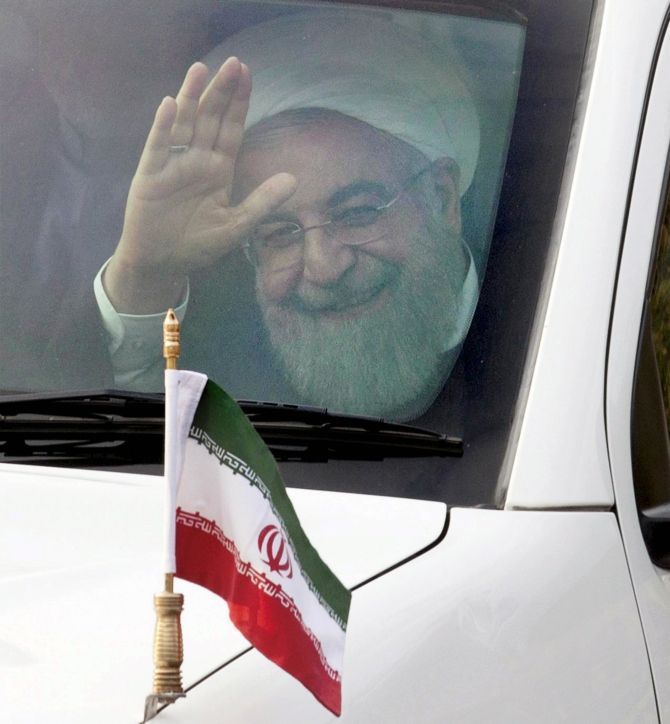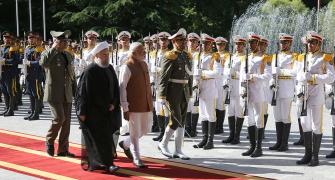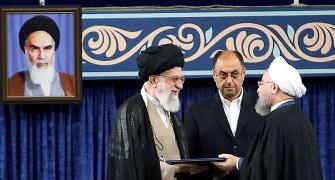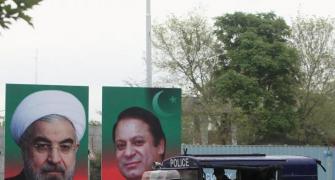On his first visit after assuming office in 2013, Iranian President Hassan Rouhani on Thursday arrived in Hyderabad for a three-day India trip during which he will hold talks with Prime Minister Narendra Modi on trade, security and connectivity, including the strategically-important Chabahar port.

Rouhani was received by Union Minister of State for Power R K Singh and Telangana and Andhra Pradesh Governor ESL Narasimhan at the Begumpet airport.
During his two-day visit to Hyderabad, President Rouhani, who is accompanied by a 21-member delegation, will also meet people of Iranian-origin living in Hyderabad.
The two sides are also looking at inking a number of pacts in several key areas apart from exploring the scope of cooperation in fields such as health and traditional medicine during the visit, which is part of India's continued regional engagement, official sources said.
They also referred to Modi's recent visit to the UAE and other countries in the Gulf and West Asia, to highlight India's growing cooperation with countries in the region.
Iran and India have already operationalised a mechanism under which Indian businessmen can invest in projects in Iran in Indian rupees, the sources said. The move is expected to boost Indo-Iran trade ties tremendously.
While there was no pact expected to be signed on security cooperation, the joint statement will talk about the engagement between the two countries in that area, including the interactions between their national security councils, the sources said.
Asked if cross-border terrorism emanating from Pakistan will be raised, the sources said terrorism is a shared concern but whether any specific country will be mentioned, could not be stated.
Also, whether India will seek Iran's help in the Kulbhushan Jadhav case given that it maintains that the retired Indian naval officer was kidnapped from Iran, the sources said Jadhav is not a bilateral issue between India and Iran.
Asked if India would raise the issue of its investment in Iran's Farzad-B gas field, the sources said there were commercial discussions on to find a "win-win" solution.
Asserting that connectivity is among the key themes, they said efforts would be to take forward the operational part of the strategically-important Chabahar port.

During Modi's bilateral visit to Iran in 2016, nearly a dozen pacts were signed between the two countries.
The Trilateral Transit Agreement (Chabahar Agreement) was also signed by transport ministers of India, Iran and Afghanistan in the presence of Modi, Rouhani and Afghan President Ashraf Ghani.
The contract entails capital investment of USD 85 million by India for equipping Chabahar port in southeastern Iran.
The strategically important port will open up the transit route for India to Iran and Afghanistan, bypassing Pakistan.
India and Iran have robust economic and commercial ties covering many sectors though it has traditionally been dominated by the import of Iranian crude oil by India, which continued to engage with Iran at the time of sanctions.
According to the external affairs ministry, India-Iran bilateral trade during the fiscal year 2016-17 was USD 12.89 billion. India imported USD 10.5 billion worth of goods, mainly crude oil, and exported commodities worth USD 2.4 billion.
India is hosting Rouhani nearly a month after the visit of Israeli prime minister Benjamin Netanyahu.
Other issues which are expected to be discussed will include visa liberalisation for greater people-to-people contact.
In New Delhi, apart from holding extensive talks with Modi and other Indian leaders, the Iranian leader is also scheduled to deliver a special address at the Observer Research Foundation on Saturday.
Rouhani is also expected to visit historic sites, including the Qutub Shahi tombs at Golconda in Hyderabad.
This is Rouhani's second visit to Hyderabad and the first after becoming president.
He would stay at the Taj Krishna hotel on Thursday night, and leave for New Delhi on Friday evening.
On Rouhani addressing a congregation at the historic Mecca Masjid in Hyderabad after offering Friday prayers, the sources said, the Iranian side showed interest in offering prayers and India had no problem in accepting it.
Photographs: PTI Photo









